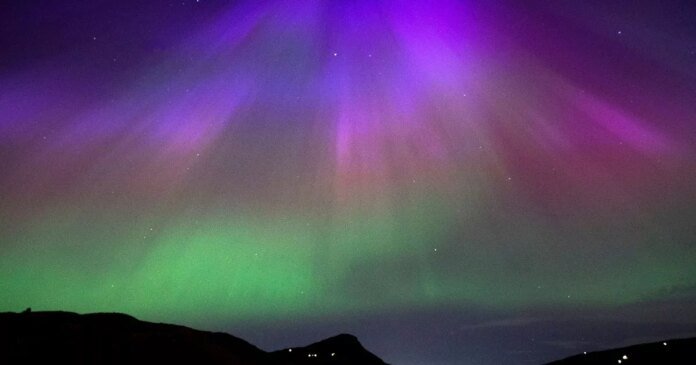Britons may have the chance to witness the mesmerizing Northern Lights right from their own country as the spectacular phenomenon is expected to light up the skies this week. According to the Met Office’s space weather forecast, the aurora borealis is likely to be visible across most parts of the UK from Monday night through Wednesday night. Although traditionally more prominent in northern Scotland and northern England, the Northern Lights might be seen further south if visibility conditions are favorable, as stated by the Met Office.
The enhanced solar activity leading to this phenomenon is attributed to a rapid coronal mass ejection (CME) that departed from the Sun late on Sunday and is anticipated to reach Earth by late Monday or early Tuesday, September 2. This event is predicted to boost geomagnetic activity, potentially extending the visibility of the aurora further south than usual.
The Met Office suggests that due to the CME’s arrival, there is a rare possibility of spotting the aurora across much of the UK with the naked eye, eliminating the need for photographic equipment. However, the northern regions still offer the best chances of witnessing this natural spectacle, emphasized by forecasters.
Nevertheless, factors such as cloud cover and light pollution could hinder visibility, as noted by the Met Office. The weather outlook for September 1 to 3 indicates considerable cloud cover during the evenings, with the Midlands likely to have clearer skies on September 1 for potential viewing. Subsequently, nighttime conditions may worsen on September 2 and 3, with regions like northern Scotland and northern England having relatively clearer skies but still not ideal for viewing. The presence of a waxing gibbous moon may further obstruct views, especially in areas with light pollution.
Forecasters anticipate that the Northern Lights may still be visible between Tuesday and Wednesday night, primarily in the northern parts of the country. However, the likelihood of further aurora sightings decreases from Wednesday night onward, as no significant solar activity is expected at that time, according to the Met Office.
Despite less-than-ideal conditions, skywatchers are advised to remain hopeful, as there is a chance of clearer skies for a memorable display. Krista Hammond, Met Office Space Weather Manager, mentioned the potential for aurora sightings further south than usual on Monday night as they monitor the coronal mass ejection’s progress. It is recommended to stay updated with the latest information as forecasts can change rapidly to catch the best views of this celestial phenomenon.
